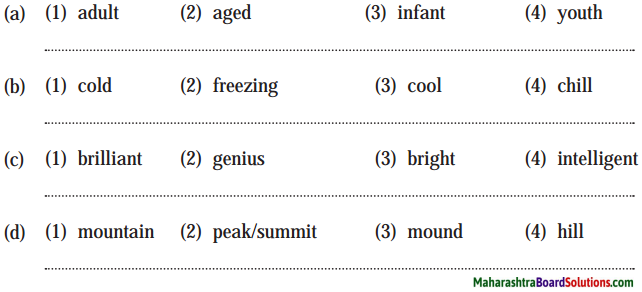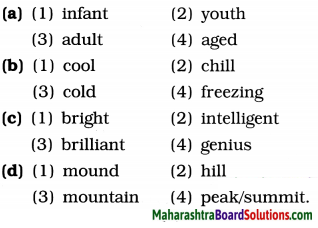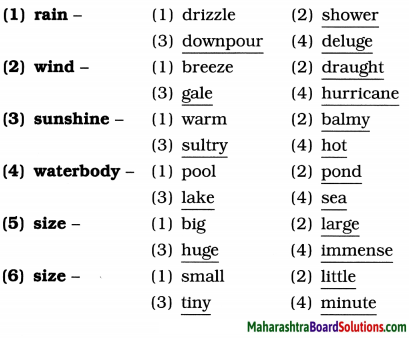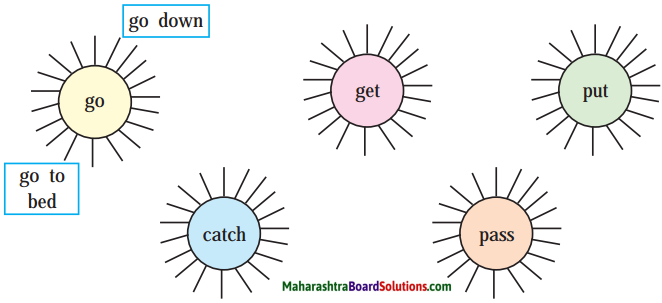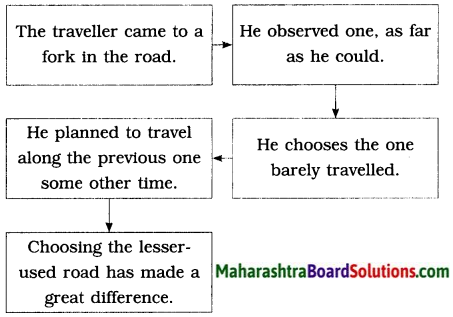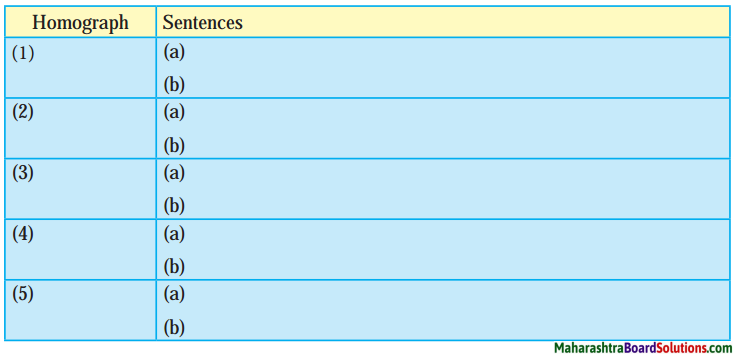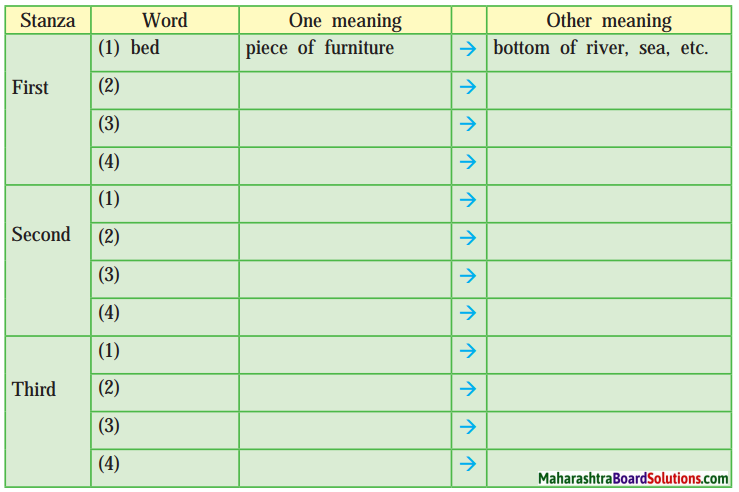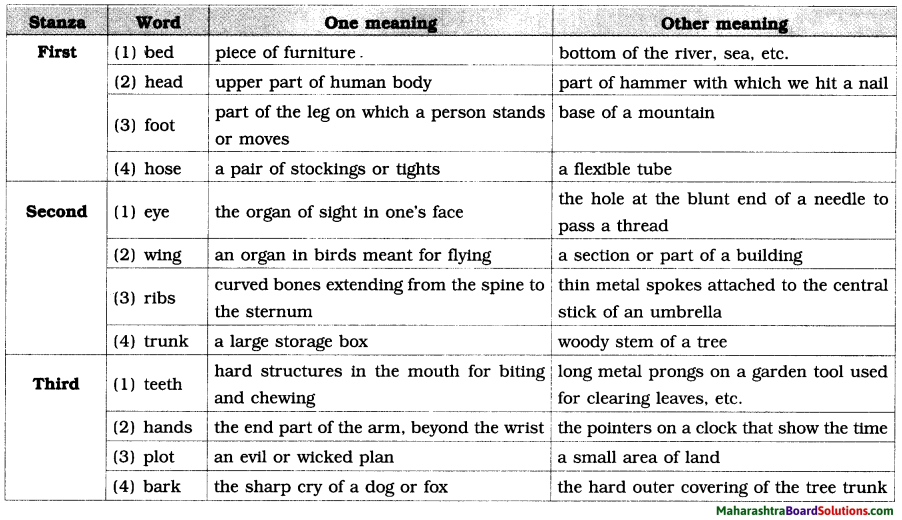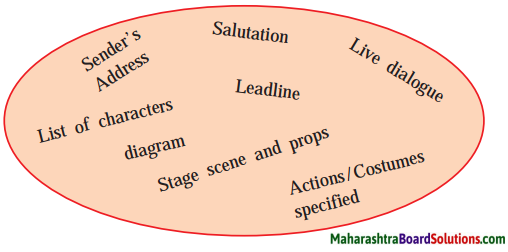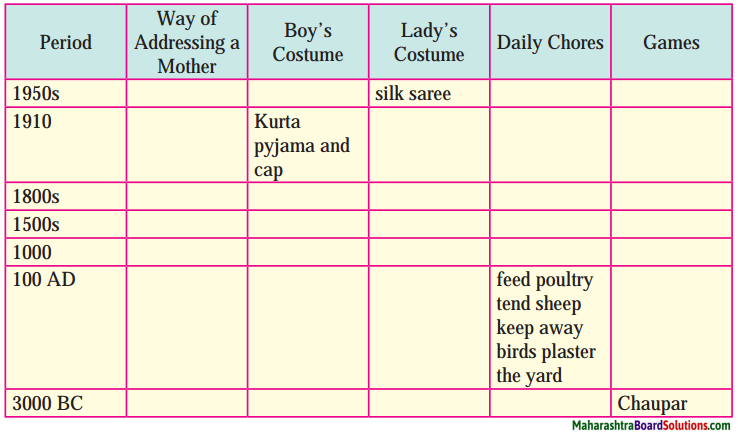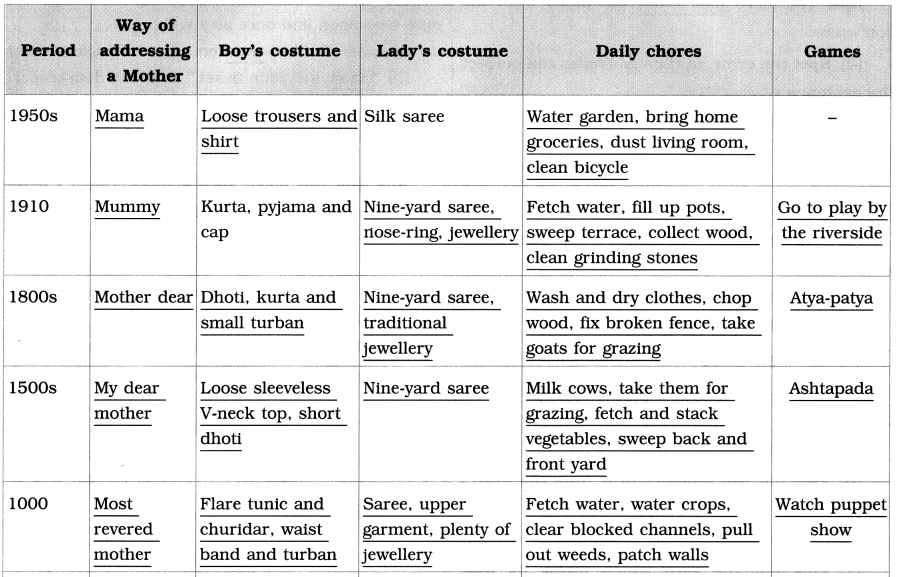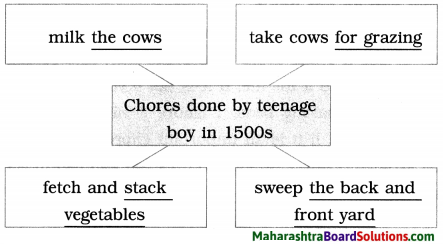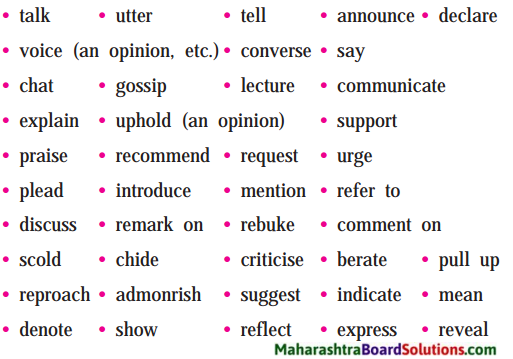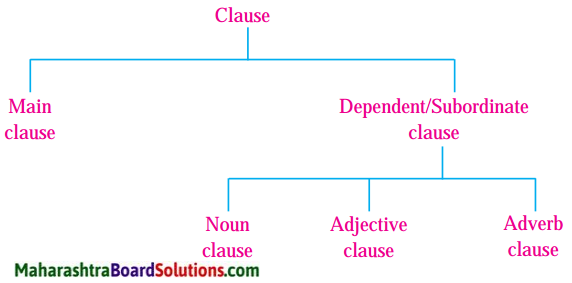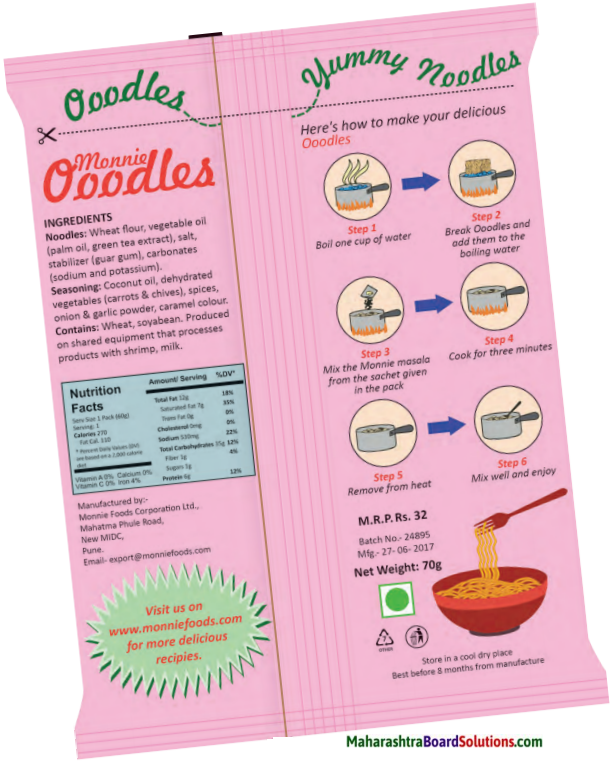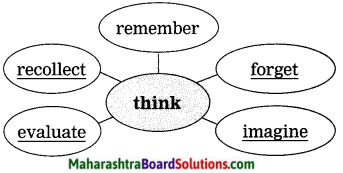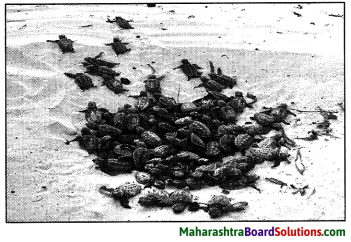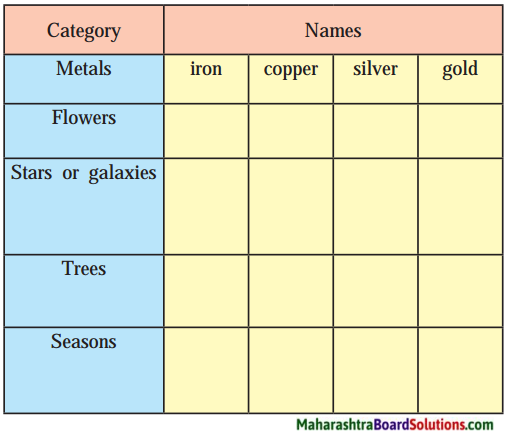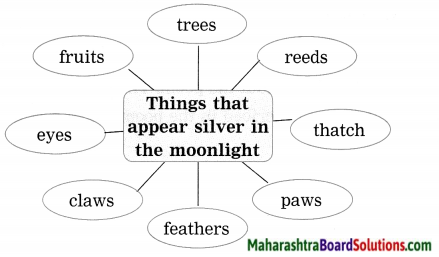Class 9 English Chapter 4.2 Question Answer Maharashtra Board
Balbharti Maharashtra State Board Class 9 English Solutions Kumarbharati Chapter 4.2 The Storyteller Notes, Textbook Exercise Important Questions and Answers.
The Storyteller 9th Std Question Answer
English Kumarbharati 9th Solutions Chapter 4.2 The Storyteller Textbook Questions and Answers
Warming Up:
1. Short stories are of many types. Match the type of story in Column A with its description in Column B:
Question 1.
Short stories are of many types. Match the type of story in Column A with its description in Column B:
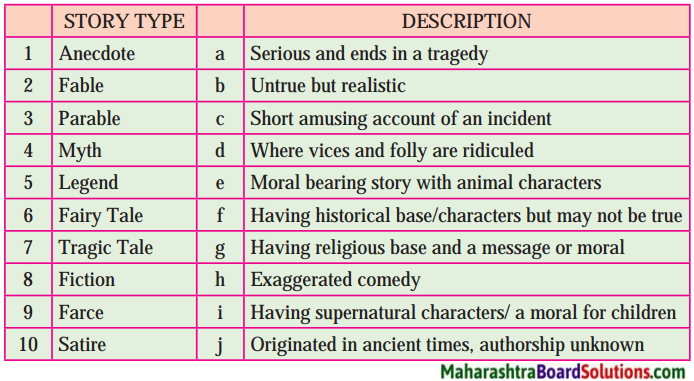
Answer:
| Story type (A) | Description (B) |
| 1. Anecdote | (a) serious and ends in tragedy |
| 2. Fable | (b) untrue but realistic |
| 3. Parable | (c) short amusing account of an incident |
| 4. Myth | (d) where vices and folly are ridiculed |
| 5. Legend | (e) moral bearing story with animal characters |
| 6. Fairy Tale | (f) having historical base/characters but may not be true |
| 7. Tragic Tale | (g) having religious base and a message or moral |
| 8. Fiction | (h) exaggerated comedy |
| 9. Farce | (i) having supernatural characters/ a moral for children |
| 10. Satire | (j) originated in ancient time, authorship unknown |
- Anecdote – (c) short amusing account of an incident
- Fable -(e) moral bearing story with animal characters
- Parable – (g) having religious base and a message or moral
- Myth-(j) originated in ancient time, authorship unknown
- Legend – (f) having historical base/characters but may not be true
- Fairy Tale – (i) having supernatural characters/a moral for children
- Tragic Tale – (a) serious and ends in tragedy
- Fiction – (b) untrue but realistic
- Farce -(h) exaggerated comedy
- Satire -(d) where vices and folly are ridiculed
![]()
2. Complete the following story using the verbs in the brackets in their proper form:
Question 2.
Complete the following story using the verbs in the brackets in their proper form:
Footprint
One night a man ………………………….. (have) a dream. He …………………………….. (dream) that he was …………………. (walk) along the beach with god. Across the sky flashed scenes from his life. For each scene, he noticed two sets of foot prints in the sand; one …………………….. (belong) to him and the other, to God.
After the last scene ………………………….. (flash), he looked back at the footprints in the sand. He ………………………….. (observe) that many times along the path of his life there ………………………….. (be) only one set of footprints and that it ………………………….. (happen) at the saddest, most ………………………….. (trouble) times of his life.
He ………………………….. (question) God about it. “God, you ………………………….. (say) that once I ………………………….. (decide) to follow you, you ………………………….. (will) walk with me all the way. So I don’t understand, why you ………………………….. (leave) me alone, when I ………………….. (need) you most.”
God replied, “During your times of trials and sufferings, where you ………………………….. (see) only one set of footprints, they ………………………….. (be) mine for it was then that I ………………………….. (carry) you in my arms.”
Answer:
Footprint
One night a man had a dream. He dreamt that he was walking along the beach with God. Across the sky flashed scenes from his life. For each scene, he noticed two sets of footprints in the sand; one belonging to him and the other, to God.
After the last scene had flashed, he looked back at the footprints in the sand. He observed that many times along the path of his life there were only one set of footprints and that it had happened at the saddest, most troubled times of his life.
He questioned God about it. “God, you said that once I decided to follow you, you would walk with me all the way. So I don’t understand why you left me alone when I needed you the most.”
God replied, “During your times of trials and sufferings, where you saw only one set of footprints, they were mine, for it was then that I carried you in my arms.”
English Workshop:
1. From the story (Part I and Part II), find 4 words that begin with the prefIx ‘un-‘ and write their opposites.
Question 1.
From the story (Part I and Part II), find 4 words that begin with the prefIx ‘un-‘ and write their opposites.
- ………….. × …………..
- ………….. × …………..
- ………….. × …………..
- ………….. × …………..
- ………….. × …………..
- ………….. × …………..
Answer:
- unsympathetic × sympathetic
- unable × able
- unenterprising × enterprising
- uninteresting × interesting
- unexpected × expected
- unhappy × happy
![]()
2. Find one example/examples of the following punctuation marks from the story and copy the lines in which they are used:
Question 1.
Find one example/examples of the following punctuation marks from the story and copy the lines in which they are used:
(a) colon
(b) semi-colon
Answer:
(a) colon – Bertha was terribly frightened and thought to herself ;
(b) semi-colon – The first thing that it saw in the park was Bertha;
3. Read the following pieces from the story and suggest a title for each as shown in the first one:
Question 1.
Read the following pieces from the story and suggest a title for each as shown in the first one:
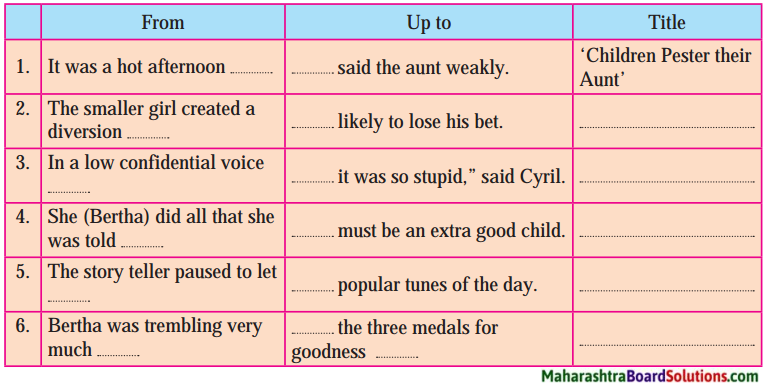
Answer:
| From | Up to | Title |
| 1. It was a hot afternoon ………. | ………….. said the aunt weakly. | ‘Children pester their aunt’. |
| 2. The smaller girl created a diversion ………….. | ………….. likely to lose his bet. | ‘The irritating little girl.’ |
| 3. In a low confidential voice …………… | ………….. it was so stupid,” said Cyril. | ‘Aunt tells a story.’ |
| 4. She (Bertha) did all that she was told ………….. | ………….. must be an extra good child. | ‘The horribly good Bertha.’ |
| 5. The storyteller paused to let ………….. | ………….. popular tunes of the day. | ‘Bertha’s outing at the park.’ |
| 6. Bertha was trembling very much ………….. | ……… the three medals for goodness ………. | ‘The punishment.’ |
![]()
4. Write your opinion, in your own words:
Question a.
Why, do you think, did the children dislike their aunt’s story?
Answer:
The story was uninteresting and unenterprising. The children did not like the good little girl in the story. She appeared to be too good. Besides, the aunt could not satisfy the questions that they asked. Obviously, not only was the aunt a very bad story-teller but the story too was boring. Hence the children disliked the story.
Question b.
Why did they appreciate and praise the stranger’s story?
Answer:
The children were probably tired of the moral education imparted by the aunt. So when they came across a girl who was ‘horribly’ good, and who met a terrible end, they were thrilled. Moreover, the stranger narrated the story well. Hence they appreciated and praised the story.
Question c.
Do you think Bertha should have met such a gory end to her life? Justify your answer.
Answer:
No, I don’t think that Bertha should have met such a gory end to her life. After all, she was only a small child and it was probably not her fault that she was vain about her goodness. She should have merely been frightened by the wolf, not devoured by it.
Question d.
What did the aunt fail to realize in Bertha’s story?
Answer:
The aunt failed to see Bertha’s pride in herself; she only saw that Bertha was good, but had j yet met a gory end. The aunt failed to realize that Bertha met a gory end as a punishment for her vanity.
Question e.
What is that one vice that nullifies all virtues that a person has?
Answer:
Pride is the one vice that nullifies all the virtues that a person has. However good or talented a person is, he/she is not liked if he/she is proud or vain. Many tragic heroes in fiction and history were the victims of their own pride. It is often said that ‘Pride comes before a fall’.
![]()
Question f.
Write down two or three proverbs/axioms that suit the message in Bertha’s story;
Answer:
- “Pride goes before a fall.”
- “Wealth is a gift from God, and pride is bequeathed to us from the devil.”
- “Proud people breed sad sorrows for themselves.”
5. Write three to five sentences about each of the following characters:
Question 1.
Write three to five sentences about each of the following characters:
1. The Aunt ………………………………………………………….
……………………………………………………………………………….
……………………………………………………………………………….
……………………………………………………………………………….
2. The Bachelor …………………………………………………..
……………………………………………………………………………….
……………………………………………………………………………….
……………………………………………………………………………….
3. Cyril …………………………………………………………………..
………………………………………………………………………………..
………………………………………………………………………………..
………………………………………………………………………………..
4. Bertha ………………………………………………………………..
…………………………………………………………………………………
…………………………………………………………………………………
…………………………………………………………………………………
Answer:
1. The Aunt: The aunt was a meek and mild woman. She did not understand children, and could not control them. She had no imagination to make up a story, and no skills to present the story in an interesting manner. She believed that children needed a strict moral upbringing. She was upset with the bachelor’s story and thought that it was improper.
2. The Bachelor: The bachelor was impatient with the aunt’s inability to control the children. He understood kids well and knew what type of story they wanted. He was resourceful and found a method to keep the children quiet for ten minutes. He also enjoyed the fact that the children would now trouble their aunt for an improper story.
3. Cyril: Cyril was a normal, naughty and restless boy. He had many questions to ask and wanted answers for all those questions. He was quite outspoken in saying that he found the aunt’s story stupid. He found the bachelor’s unusual story beautiful.
4. Bertha: Bertha was a very, very good little girl. She was so good that she was horrible. She was also obedient and punctual. She won many medals for her good qualities. But she had one bad quality, and that was pride. However, the moment she was in danger, she wished that she had not been so extraordinarily good. She was finally devoured by the wolf.
![]()
6. Say whether you agree or disagree.
- The children would have behaved well in the train if their aunt had scolded them harshly – Disagree
- The youngest child was most irritating – Agree
- Being a bachelor, the stranger had no patience with children – Disagree
- The children showed disinterest even in the bachelor’s story-telling, throughout – Disagree
- Bertha was very good but very proud too – Agree
- The Prince had rare, uncommon likes and dislikes – Disagree
- The wolf could not trace Bertha because she was behind a myrtle bush – Agree
- The bachelor had narrated an improper story to the children – Disagree
7. ‘The Storyteller’ has a story within a story.
Question 1.
‘The Storyteller’ has a story within a story. Search from the internet or your library books for other stories which have another story within. Enlist at least 3 to 5 of them.
Answer:
Ramayan. Mahabharat, Panchatantra.
8. List all the verbs related to ‘say’ or ‘tell’ from the passage.
Question 1.
List all the verbs related to ‘say’ or ‘tell’ from the passage.
Answer:
- Verbs related to ‘say’ or ‘tell’: said, exclaimed, added, asked, protested.
- Verbs related to ‘say’ or ‘tell’: demanded, admitted, said
- Verbs related to ‘say’ or ‘tell’: said, retort, demanded, began, asked.
- Verbs related to ‘say’ or ‘tell’: continued, quoted, demanded, said.
- Verbs related to ‘say’ or ‘tell’: said
![]()
9. Read: ‘The Open Window by H.H. Munro (Saki).
English Kumarbharati 9th Digest Chapter 4.2 The Storyteller Additional Important Questions and Answers
Simple Factual Activities:
Question 1.
Complete the following:
Answer:
- The next stop of the train was at Templecombe.
- Most of the remarks of the aunt seemed to begin with ‘Don’t’.
- The bachelor said nothing out loud.
- The child moved reluctantly to the window.
Complex Factual Activity:
Question 1.
How many occupants did the compartment have?
Answer:
The compartment had five occupants.
![]()
Question 2.
Why did the aunt have to use the word ‘Don’t’ so often?
Answer:
The children were very bored and restless and indulged in irritating activities like smacking the cushions of the seats. Hence the aunt had to use the word ‘Don’t’ very often.
Activities based on Vocabulary:
Question 1.
Write the antonyms of the following words using prefixes :
1. occupied
2. limited
Answer:
1. occupied × unoccupied
2. limited × unlimited
Activities based on Contextual Grammar:
Question 1.
Rewrite the following as indirect speech:
“But there is lots of grass in that field,” protested the boy.
Answer:
The boy protested that there was lots of grass in that field.
![]()
Question 2.
Find an example of the following punctuation mark from the passage and copy the sentence in which it is used: semi-colon
Answer:
“But there is lots of grass in that field,” protested the boy; “There’s nothing else but grass there.”
Personal Response:
Question 1.
Do you like to travel long distances by train?
Answer:
Yes, I do. Every year, we go to my native place by train, and we have a lovely time. Since we go during the Diwali holidays, the route along the Konkan Railway is very beautiful and scenic at that time. We watch the scenery flash by, and play card games when it gets dark.
Simple Factual Activities:
Question 1.
Write whether the following statements are True or False:
Answer:
- The bachelor was irritated with the situation – True
- The aunt was able to satisfy Cyril’s curiosity – False
- The smaller girl knew only one line of the poem – True
- They could see very few cows from the windows – False
Complex Factual Activity:
Question 1.
To which question from Cyril was aunt unable to give a reasonable answer?
Answer:
Aunt was unable to give a reasonable answer to Cyril’s question: ‘Why is the grass in the other field better?’
![]()
Question 2.
How did the smaller of the two girls irritate the bachelor?
Answer:
The smaller of the two girls began to recite the poem ‘On the Road to Mandalay’. She only knew the first line, but she repeated the line over and over again, in a dreamy but resolute and very audible voice. This irritated the bachelor.
Activities based on Vocabulary:
Question 1.
List all the verbs related to ‘say’ or ‘tell’ from the passage.
Answer:
Verbs related to ‘say’ or ‘tell’: suggested, exclaimed, persisted, repeated, said.
Activities based on Contextual Grammar:
Question 1.
Rewrite the following as indirect speech:
“Perhaps the grass in the other field is better,” suggested the aunt fatuously.
Answer:
The aunt suggested fatuously that perhaps the grass in the other field was better.
Question 2.
Find an example of the following punctuation mark from the passage and copy the sentence in which it is used:
semi-colon.
Answer:
She repeated the line over and over again, in a dreamy but resolute and very audible voice: it I seemed ……… .
![]()
Question 3.
Rewrite the following sentence using ‘not’:
She only knew the first line.
Answer:
She did not know any other line except the first.
Personal Response:
Question 1.
What is your opinion of the aunt?
Answer:
I feel very sorry for the aunt. She was very meek and completely unable to handle the three children. Knowing that she was going on a train journey with three small children, she should have brought something along to keep them occupied.
Who said the following words?
Question 1.
“Wouldn’t they have saved her if she hadn’t been good?”
Answer:
the bigger of the two girls
Question 2.
“Well, yes,”
Answer:
the aunt
![]()
Question 3.
“I didn’t listen after the first bit.”
Answer:
Cyril
Question 4.
“It’s the stupidest story I’ve ever heard.”
Answer:
the bigger of the two girls
Complex Factual Activity:
Question 1.
How did the children show their disapproval of the aunt’s story?
Answer:
The children interrupted the story at frequent intervals with loud, petulant questionings. After the story was over, the bigger girl said that it was the stupidest story she had ever heard. Cyril agreed with her that it was stupid. The smaller girl had stopped listening and was repeating her favourite line from the poem.
![]()
Activities based on Vocabulary:
Question 2.
Give the noun forms of the following words:
1. moral
2. stupid
Answer:
1. moral – morality
2. stupid – stupidity
Activities based on Contextual Grammar:
Question 1.
Rewrite the following as indirect speech:
“Wouldn’t they have saved her if she hadn’t been good?” demanded the bigger of the small girls.
Answer:
The bigger of the small girls demanded whether they wouldn’t have saved her if she hadn’t been good.
Question 2.
Frame Wh-questions to get the underlined parts in the following sentences as the answers:
1. Her reputation as a story-teller did not rank high.
2. In a low, confidential voice she began the story
Answer:
1. What did not rank high?
2. How did she begin the story?
![]()
Factual Activities:
Question 1.
Write four words to describe Bertha to complete the web:
Answer:
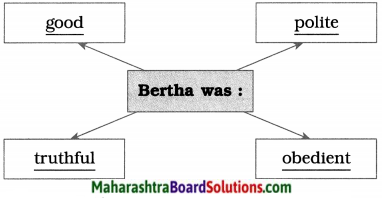
Complex Factual Activity:
Question 1.
What did the bachelor not agree with?
Answer:
The aunt said that it was a very difficult thing to tell stories that children can both understand and appreciate. The bachelor did not agree with this statement.
Question 2.
What roused the children’s interest in the story?
Answer:
The bachelor said that the good little Bertha was ‘horribly’ good. When the children heard this, their interest was roused. The word ‘horrible’ in connection with goodness was something new that they appreciated and found acceptable.
![]()
Activities based on Vocabulary:
Question 1.
Write the gender of the following :
- bachelor
- aunt
- children
- infant
Answer:
- bachelor – masculine gender
- aunt – feminine gender
- children – common gender
- fant – common gender.
Activities based on Contextual Grammar:
Question 1.
Rewrite the following as indirect speech:
“Was she pretty?” asked the bigger of the small girls.
Answer:
The bigger of the small girls asked whether she was pretty,
![]()
Question 2.
Find an example of the following punctuation mark from the passage and copy the sentences in which it is used:
semi-colon.
Answer:
1. The children’s momentarily-aroused interest began at once to flicker; all stories seemed………
2. There was a wave of reaction in favour of the story; the word horrible in connection with goodness…………
Question 3.
Rewrite the following sentences using ‘not only … but also …’ :
1. She was always truthful, she kept her clothes clean.
2. It’s a very difficult thing to tell stories that children can both understand and appreciate.
Answer:
1.She was not only always truthful, but she also kept her clothes clean.
2. It’s a very difficult thing to tell stories that children can not only understand but also appreciate.
Personal Response:
Question 1.
Do you like stories that have a moral or a message?
Answer:
That depends on the way the story is narrated and the message that is in the story. I don’t like the usual fairy-tale stories or the do-good type stories now; I like stories that make me think about something or affect me positively in some way.
Simple Activities:
Question 1.
Punctuate:
dont cyril dont exclaimed the aunt as the small boy began sacking the cushions of the seat
Answer:
“Don’t, Cyril, don’t,” exclaimed the aunt, as the small boy began sacking the cushions of the seat.
![]()
Question 2.
Make a meaningful sentence using the I phrase ‘over and over again’:
Answer:
The little girl repeated the answer over and over again.
Question 3.
Spot the error and correct the sentence:
I doesn’t agree with you,” said the bachelor.
Answer:
“I don’t agree with you,” said the bachelor.
Question 4.
Pick out the present participle/s from the given sentence:
She began an unenterprising and uninteresting story about a little girl who was good.
Answer:
unenterprising, uninteresting
Question 5.
Identify the type of sentence:
Why is it better?
Answer:
Interrogative sentence
![]()
Question 6.
Find out two hidden words from the word ‘character’.
Answer:
character-react, chart (heart, charter).
Question 7.
Form the present participle of a verb from the lesson in which the last letter is doubled.
Answer:
begin -beginning.
Question 8.
Write the following words in alphabetical order:
fatuously, inevitable, interest, estimation.
Answer:
estimation, fatuously, inevitable, interest.
Question 9.
Make a word chain of about four adjectives of your own.
Answer:
polite → excellent thoughtful → lovely → youthful
Medium-Level Activities:
Question 1.
Use the word fast in two separate sentences, the word having different meanings (homographs):
Answer:
(a) “This is a fast train and doesn’t stop at all the stations,” said the woman.
(b) The saint refused to break his fast.
![]()
Question 2.
“Why is the grass in the other field better?” persisted Cyril. (Rewrite using indirect speech.)
Answer:
Cyril asked persistently why the grass in the other field was better.
Question 3.
The children moved listlessly. (Use the past continuous tense of the verb.)
Answer:
The children were moving listlessly.
Challenging Activities:
Question 1.
Use the following word in two separate sentences, once as a noun and once as a verb: interest
Answer:
(a) I have no interest in politics, (noun)
(b) Military history doesn’t really interest me. (verb)
Question 2.
This is the stupidest story I’ve ever heard. (Change the degree of comparison.)
Answer:
(a) I’ve never heard a story as stupid as this. (Positive)
(b) This story is stupider/more stupid than any story I’ve ever heard. (Comparative)
![]()
Simple Factual Activities:
Question 1.
Write if the following statements are True or False:
Answer:
- There were no sheep in the park – True
- Bertha was allowed to walk in the park twice a week – False
- There were no animals at all in the park – False
- Bertha had the most medals in the town – True
Complex Factual Activity:
Question 1.
For which three values did Bertha win medals? What was exceptional about it?
Answer:
Bertha won medals for obedience, punctuality and good behaviour. This was exceptional because no other child in the town where she lived had as many as three medals, which Bertha had.
Question 2.
How did the Prince reward Bertha?
Answer:
The Prince rewarded Bertha by allowing her to walk in his beautiful park once a week. As no children were ever allowed in it, this was great honour for Bertha.
![]()
Activities based on Vocabulary:
Question 1.
Write the plural of the following words:
- country
- dress
- storyteller
- punctuality
Answer:
- country – countries
- dress – dresses
- storyteller – storytellers
- punctuality – punctuality
Activities based on Contextual Grammar:
Question 1.
Find example /examples of the following punctuation marks from the story and copy the lines in which they are used:
1. colon
2. semi-colon
Answer:
1. colon – then he resumed
2. semi-colon – sink into the children’s imaginations
![]()
Question 2.
Rewrite the following as indirect speech:
“Were there any sheep on the park?” demanded Cyril.
Answer:
Cyril asked in a demanding tone if there were any sheep in the park.
Question 3.
No other child in the town had as many as three medals. (Rewrite beginning ‘She was….’.)
Answer:
She was the only child in the town who had as many as three medals.
Personal Response:
Question 1.
Do you like listening to stories?
Answer:
I generally don’t like listening to stories; but if they are short and interesting, then I listen. It also depends on the narrator; if it is narrated well, then I like to listen. I used to listen to a lot of stories in my childhood, told by my grandmother.
Simple Factual Activities:
Question 1.
Answer what the following things are, in one or two words:
Answer:
- Bertha was sorry about the absence of this. flowers.
- Bertha meant to keep this. her promise.
- The flowers had been eaten by these. the animals.
- They clinked against one another. the medals.
![]()
Complex Factual Activity:
Question 1.
Why did the children approve of the Prince’s decision?
Answer:
Maybe the children liked animals better than they liked flowers. Besides, they were probably happy that the good Bertha had no flowers she couldn’t pick. Hence they approved of the Prince’s decision.
Activities based on Vocabulary:
Question 1.
Fill in the blanks with the correct adjectives:
- ……………….. things
- ……………….. birds
- ………………….. parrots
- ………………. tunes
Answer:
- delightful things
- hummingbirds
- beautiful parrots
- popular tunes
Question 2.
Match the words with the parts of speech they belong to, with reference to the passage:
| A | B |
| 1. with | (a) adverb |
| 2. approval | (b) adjective |
| 3. rather | (c) preposition |
| 4. green | (d) noun |
Answer:
- with – preposition
- approval – noun
- rather – adverb
- green – adjective
![]()
Activities based on Contextual Grammar:
Question 1.
Find example/examples of the following punctuation marks from the story and copy the j lines in which they are used:
1. colon
2. semi-colon
Answer:
1. colon: Bertha walked up and down and enjoyed herself immensely, and thought to herself
2. semi-colon: There was a murmur of approval at the excellence of the Prince’s decision
Question 2.
Rewrite the following as indirect speech:
“Because the animals had eaten them all,” said the bachelor promptly.
Answer:
The bachelor promptly said that it was because the animals had eaten them all.
Question 3.
It made her feel silly to find that there were no flowers to pick.
(Replace the underlined words with gerunds.)
Answer:
Finding that there were no flowers for picking made her feel silly.
Simple Factual Activities:
Question 1.
Complete the following statements:
Answer:
- An enormous wolf came prowling into the park.
- The wolf came after her with huge leaps and bounds.
- Bertha managed to reach a shrubbery of myrtle bushes.
- Bertha hid herself in one of the thickest of the bushes.
![]()
Complex Factual Activity:
Question 1.
Why did Bertha wish she had never come to the park?
Answer:
Bertha saw an enormous wolf come stealing towards her. She was terribly frightened and wished she had never come to the park.
Question 2.
Why was the wolf unable to trace Bertha?
Answer:
The scent of the myrtle was so strong that the wolf could not sniff out where Bertha was hiding. The bushes were also too thick for him to see her.
Activity-based on Vocabulary:
Question 1.
Match the words in Columns A, B and C correctly:
| A | B | C |
| 1. white | myrtle | eyes |
| 2. pale | little | bushes |
| 3. thick | clean | animal |
| 4. fat | grey | pinafore |
Answer:
- white – clean – pinafore
- pale – grey – eyes
- thick – myrtle – bushes
- fat – little – animal.
![]()
Do as Directed:
Question 1.
The scent of the myrtle was so strong that the wolf could not sniff out where Bertha was hiding. (Rewrite using ‘too … to …’.)
Answer:
The scent of the myrtle was too strong for the wolf to sniff out where Bertha was hiding.
Question 2.
She managed to reach a shrubbery of myrtle bushes and she hid herself in one of the thickest of the bushes. (Rewrite as a simple sentence.)
Answer:
Managing to reach a shrubbery of myrtle bushes, she hid herself in one of the thickest of the bushes.
Personal Response:
Question 1.
Do you like Bertha? Why?
Answer:
No, I don’t like Bertha. She is too good to be true. She also knows that she is good and she is proud of this fact. This makes her irritating and horrible.
Who said the following:
Question 1.
Unhappy woman!
Answer:
the bachelor
![]()
Question 2.
The story began badly.
Answer:
the bigger of the small girls
Question 3.
A most improper story.
Answer:
the aunt
Question 4.
I kept them quiet for ten minutes.
Answer:
the bachelor
Complex Factual Activity:
Question 1.
What gave Bertha away and how did she meet her end?
Answer:
The clinking of her medals gave Bertha away. The wolf dashed into the bush in which she was hiding, dragged her out and devoured her to the last morsel.
Question 2.
What impact did the story have on the children?
Answer:
The children loved the story and said it was the most beautiful story they had ever heard. It had also kept them quiet for the remainder of the train journey.
![]()
Question 3.
Why was their aunt annoyed with the bachelor?
Answer:
Their aunt had probably always been telling the children the advantages of having a good moral character. Now, in the bachelor’s story, the extremely good Bertha had met a terrible end. So the aunt was annoyed with the bachelor for undermining the effect of years of her careful teaching.
Activities based on Vocabulary:
Question 1.
List all the verbs related to ‘say’ or ‘tell’ from the passage.
Answer:
Verbs related to ‘say’ or ‘tell’: said, observed.
Question 2.
Pick out at least six abstract nouns from the passage :
Answer:
Abstract nouns are: obedience, conduct, punctuality, ferocity, triumph, goodness, (decision, opinion)
Activities based on Contextual Grammar:
Question 1.
Find example/examples of the following punctuation marks from the story and copy the ! sentence in which they are used: semi-colon
Answer:
1. The wolf was just moving away, when he heard the sound of the medals clinking and stopped to listen;
2. “Unhappy woman!” he observed to himself as he walked down the platform of Templecombe station.
![]()
Question 2.
Rewrite the following as indirect speech:
“Unhappy woman!” he observed to himself.
Answer:
He observed to himself that she was an unhappy woman.
Simple Activities:
Question 1.
Punctuate:
it is the only beautiful story ive ever heard said cyril
Answer:
“It is the only beautiful story I’ve ever heard,” said Cyril.
Question 2.
Make a meaningful sentence using the phrase ‘from a great distance’.
Answer:
The frightened king watched the lion from a great distance.
![]()
Question 3.
Spot the error and correct the sentence:
So many people would has decided the other way.
Answer:
So many people would have decided the other way.
Question 4.
Pick out the infinitive in the given sentence and use it in a sentence of your own:
She had meant to keep her promise.
Answer:
The maid was not allowed to keep the clothes in the cupboard.
Question 5.
Identify the type of sentence:
Why weren’t there any flowers?
Answer:
Interrogative sentence
Question 6.
Find out two hidden words from the word ‘belongings’.
Answer:
belongings – belong, longing (going, single)
![]()
Question 7.
Form the present and past participle of a verb in which the last letter is doubled.
Answer:
excel – excelled, excelling
Question 8.
Write the given words in alphabetical order: approval, animals, enormous, beautiful
Answer:
animals, approval, beautiful, enormous
Medium-Level Activities:
Question 1.
Use the word ‘rage’ in two separate sentences, the word having different meanings (homographs) :
Answer:
(a) Thick denims soon became a great rage all over the world.
(b) She walked off the stage in a rage.
![]()
Question 2.
“The story began badly,” said the smaller of S the small girls. (Rewrite using indirect speech.)
Answer:
The smaller of the small girls said that the story had begun badly.
Question 3.
She had meant to keep her promise.
(Use the present tense of the verb.)
Answer:
She means to keep her promise.
Question 4.
Everybody talked about her goodness.
(Change the voice beginning ‘Her….’.)
Answer:
Her goodness was talked about by everybody.
Challenging Activities:
Question 1.
Use the word ‘park’ in two separate sentences, once as a noun and once as a verb :
Answer:
(a) Children love going to the park to play. (noun)
(b) The driver was looking for a place to park the car. (verb)
![]()
Question 2.
Use the words ‘immense’ and ‘beautiful’ in a single sentence of your own.
Answer:
The immense mountain had beautiful flowers on its slopes.
Maharashtra State Board Class 9 English Solutions
Kumarbharati 9th Std English Textbook Answers Unit 4
